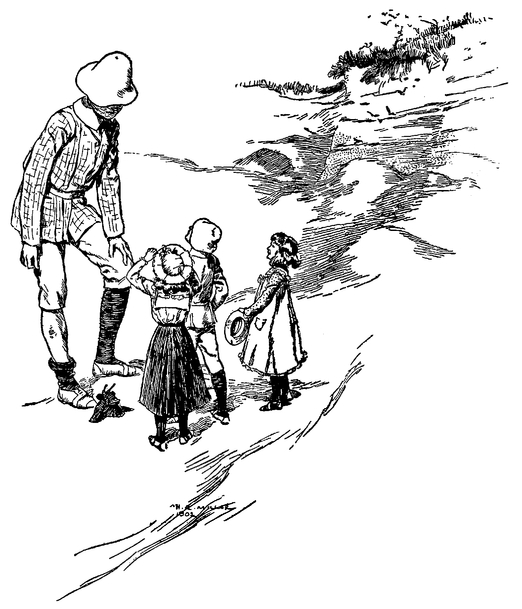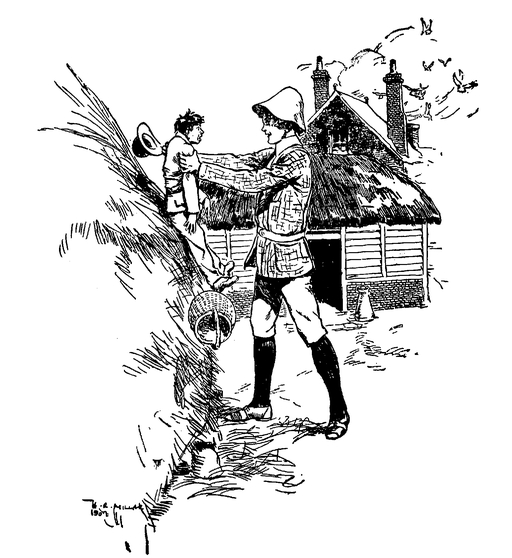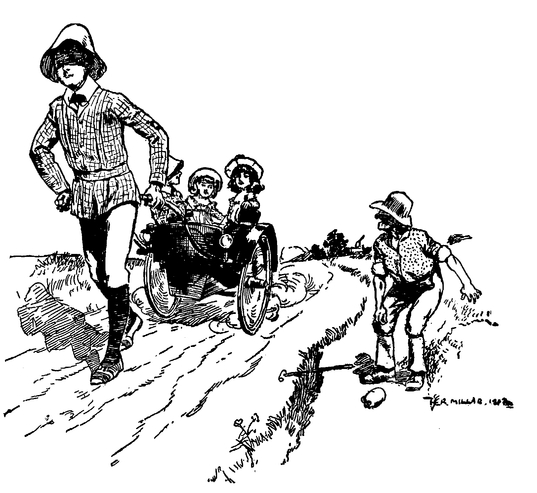Enchanted Castle and Five Children and It (Barnes & Noble Classics Series) (22 page)
Read Enchanted Castle and Five Children and It (Barnes & Noble Classics Series) Online
Authors: Edith Nesbit
Cyril was just tearing off his coat so as to help his brother in proper style, when Jane threw her arms round his legs and began to cry and ask him not to go and be beaten too. That “too” was very nice for Robert, as you can imagine—but it was nothing to what he felt when Anthea rushed in between him and the baker’s boy, and caught that unfair and degraded fighter round the waist, imploring him not to fight any more.
“Oh, don’t hurt my brother any more!” she said in floods of tears. “He didn’t mean it—it’s only play. And I’m sure he’s very sorry.”
You see how unfair this was to Robert. Because, if the baker’s boy had had any right and chivalrous instincts, and had yielded to Anthea’s pleading and accepted her despicable apology, Robert could not, in honour, have done anything to him at a future time. But Robert’s fears, if he had any, were soon dispelled. Chivalry was a stranger to the breast of the baker’s boy. He pushed Anthea away very roughly, and he chased Robert with kicks and unpleasant conversation right down the road to the sand-pit, and there, with one last kick, he landed him in a heap of sand.
“I’ll larn you, you young varmint!” he said, and went off to pick up his loaves and go about his business. Cyril, impeded by Jane, could do nothing without hurting her, for she clung round his legs with the strength of despair. The baker’s boy went off red and damp about the face; abusive to the last, he called them a pack of silly idiots, and disappeared round the corner. Then Jane’s grasp loosened. Cyril turned away in silent dignity to follow Robert, and the girls followed him, weeping without restraint.
It was not a happy party that flung itself down in the sand beside the sobbing Robert. For Robert was sobbing—mostly with rage. Though of course I know that a really heroic boy is always dry-eyed after a fight. But then he always wins, which had not been the case with Robert.
Cyril was angry with Jane; Robert was furious with Anthea; the girls were miserable; and not one of the four was pleased with the baker’s boy. There was, as French writers say, “a silence full of emotion.”
Then Robert dug his toes and his hands into the sand and wriggled in his rage. “He’d better wait till I’m grown up—the cowardly brute! Beast!—I hate him! But I’ll pay him out. Just because he’s bigger than me.”
“You began,” said Jane incautiously.
“I know I did, silly—but I was only rotting—and he kicked me—look here—”
Robert tore down a stocking and showed a purple bruise touched up with red.
“I only wish I was bigger than him, that’s all.”
He dug his fingers in the sand, and sprang up, for his hand had touched something furry. It was the Psammead, of course—“On the look-out to make sillies of them as usual,” as Cyril remarked later. And of course the next moment Robert’s wish was granted, and he was bigger than the baker’s boy. Oh, but much, much bigger. He was bigger than the big policeman who used to be at the crossing at the Mansion House
bk
years ago—the one who was so kind in helping old ladies over the crossing—and he was the biggest man I have ever seen, as well as the kindest. No one had a foot-rule in its pocket, so Robert could not be measured—but he was taller than your father would be if he stood on your mother’s head, which I am sure he would never be unkind enough to do. He must have been ten or eleven feet high, and as broad as a boy of that height ought to be, his Norfolk suit had fortunately grown too, and now he stood up in it-with one of his enormous stockings turned down to show the gigantic bruise on his vast leg. Immense tears of fury still stood on his flushed giant face. He looked so surprised, and he was so large to be wearing an Eton collar,
bl
that the others could not help laughing.
bk
years ago—the one who was so kind in helping old ladies over the crossing—and he was the biggest man I have ever seen, as well as the kindest. No one had a foot-rule in its pocket, so Robert could not be measured—but he was taller than your father would be if he stood on your mother’s head, which I am sure he would never be unkind enough to do. He must have been ten or eleven feet high, and as broad as a boy of that height ought to be, his Norfolk suit had fortunately grown too, and now he stood up in it-with one of his enormous stockings turned down to show the gigantic bruise on his vast leg. Immense tears of fury still stood on his flushed giant face. He looked so surprised, and he was so large to be wearing an Eton collar,
bl
that the others could not help laughing.
“The Sammyadd’s done us again,” said Cyril.
“Not us—me,” said Robert. “If you’d got any decent feeling you’d try to make it make you the same size. You’ve no idea how silly it feels,” he added thoughtlessly.
“And I don’t want to; I can jolly well see how silly it looks,” Cyril was beginning; but Anthea said:
“Oh, don’t! I don’t know what’s the matter with you boys today. Look here, Squirrel, let’s play fair. It is hateful for poor old Bobs, all alone up there. Let’s ask the Sammyadd for another wish, and, if it will, I do really think we ought to be made the same size.”
The others agreed, but not gaily; but when they found the Psammead, it wouldn’t.
“Not I,” it said crossly, rubbing its face with its feet. “He’s a rude violent boy, and it’ll do him good to be the wrong size for a bit. What did he want to come digging me out with his nasty wet hands for? He nearly touched me! He’s a perfect savage. A boy of the Stone Age would have had more sense.”
Robert’s hands had indeed been wet—with tears.
“Go away and leave me in peace, do,” the Psammead went on. “I can’t think why you don’t wish for something sensible—something to eat or drink, or good manners, or good tempers. Go along with you, do!”
“The Sammyadd’s done us again,” said Cyril

It almost snarled as it shook its whiskers, and turned a sulky brown back on them. The most hopeful felt that further parley was vain.
They turned again to the colossal Robert.
“Whatever shall we do?” they said; and they all said it.
“First,” said Robert grimly, “I’m going to reason with that baker’s boy. I shall catch him at the end of the road.”
“Don’t hit a chap littler than yourself, old man,” said Cyril.
“Do I look like hitting him?” said Robert scornfully. “Why, I should kill him. But I’ll give him something to remember. Wait till I pull up my stocking.” He pulled up his stocking, which was as large as a small bolstercase,
bm
and strode off. His strides were six or seven feet long, so that it was quite easy for him to be at the bottom of the hill, ready to meet the baker’s boy when he came down swinging the empty basket to meet his master’s cart, which had been leaving bread at the cottages along the road.
bm
and strode off. His strides were six or seven feet long, so that it was quite easy for him to be at the bottom of the hill, ready to meet the baker’s boy when he came down swinging the empty basket to meet his master’s cart, which had been leaving bread at the cottages along the road.
Robert crouched behind a haystack in the farmyard, that is at the corner, and when he heard the boy come whistling along, he jumped out at him and caught him by the collar.
“Now,” he said, and his voice was about four times its usual size, just as his body was four times its, “I’m going to teach you to kick boys smaller than you.”
He lifted up the baker’s boy and set him on the top of the haystack, which was about sixteen feet from the ground, and then he sat down on the roof of the cowshed and told the baker’s boy exactly what he thought of him. I don’t think the boy heard it all—he was in a sort of trance of terror. When Robert had said everything he could think of, and some things twice over, he shook the boy and said:
“And now get down the best way you can,” and left him.
I don’t know how the baker’s boy got down, but I do know that he missed the cart, and got into the very hottest of hot water when he turned up at last at the bakehouse. I am sorry for him, but, after all, it was quite right that he should be taught that English boys mustn’t use their feet when they fight, but their fists. Of course the water he got into only became hotter when he tried to tell his master about the boy he had licked and the giant as high as a church, because no one could possibly believe such a tale as that. Next day the tale was believed—but that was too late to be of any use to the baker’s boy.
When Robert rejoined the others he found them in the garden. Anthea had thoughtfully asked Martha to let them have dinner out there—because the dining-room was rather small, and it would have been so awkward to have a brother the size of Robert in there. The Lamb, who had slept peacefully during the whole stormy morning, was now found to be sneezing, and Martha said he had a cold and would be better indoors.
He lifted up the baker’s boy and set him on top of the haystack

“And really it’s just as well,” said Cyril, “for I don’t believe he’d ever have stopped screaming if he’d once seen you the awful size you are!”
Robert was indeed what a draper would call an “out-size” in boys. He found himself able to step right over the iron gate in the front garden.
Martha brought out the dinner—it was cold veal and baked potatoes, with sago pudding and stewed plums to follow.
She of course did not notice that Robert was anything but the usual size, and she gave him as much meat and potatoes as usual and no more. You have no idea how small your usual helping of dinner looks when you are many times your proper size. Robert groaned, and asked for more bread. But Martha would not go on giving more bread for ever. She was in a hurry, because the keeper intended to call on his way to Benenhurst Fair, and she wished to be dressed smartly before he came.
“I wish
we
were going to the Fair,” said Robert.
we
were going to the Fair,” said Robert.
“You can’t go anywhere that size,” said Cyril.
“Why not?” said Robert. “They have giants at fairs, much bigger ones than me.”
“Not much, they don’t,” Cyril was beginning, when Jane screamed “Oh! ” with such loud suddenness that they all thumped her on the back and asked whether she had swallowed a plum-stone.
bn
bn
“No,” she said, breathless from being thumped, “it’s—it’s not a plum-stone. It’s an idea. Let’s take Robert to the Fair, and get them to give us money for showing him! Then we really shall get something out of the old Sammyadd at last!”
“Take me, indeed!” said Robert indignantly. “Much more likely me take you!”
And so it turned out. The idea appealed irresistibly to everyone but Robert, and even he was brought round by Anthea’s suggestion that he should have a double share of any money they might make. There was a little old pony-trap in the coach-house—the kind that is called a governess-cart. It seemed desirable to get to the Fair as quickly as possible, so Robert—who could now take enormous steps and so go very fast indeed—consented to wheel the others in this. It was as easy to him now as wheeling the Lamb in the mail-cart had been in the morning. The Lamb’s cold prevented his being of the party.
It was a strange sensation being wheeled in a pony-carriage by a giant. Everyone enjoyed the journey except Robert and the few people they passed on the way. These mostly went into what looked like some kind of standing-up fits by the roadside, as Anthea said. Just outside Benenhurst, Robert hid in a barn, and the others went on to the Fair.
It was a strange sensation being wheeled in a pony-carriage by a giant

There were some swings, and a hooting tooting blaring merry-go-round, and a shooting-gallery and coconut shies.
bo
Resisting an impulse to win a coconut—or at least to attempt the enterprise—Cyril went up to the woman who was loading little guns before the array of glass bottles on strings against a sheet of canvas.
bo
Resisting an impulse to win a coconut—or at least to attempt the enterprise—Cyril went up to the woman who was loading little guns before the array of glass bottles on strings against a sheet of canvas.
“Here you are, little gentleman!” she said. “Penny a shot!”
“No, thank you,” said Cyril, “we are here on business, not on pleasure. Who’s the master?”
Other books
Highland Protector by Hannah Howell
Trifling Favors (Redcakes Book 7) by Heather Hiestand
The Secret Chicken Society by Judy Cox
Devil's Charm by Sam Crescent
Camouflage by Gloria Miklowitz
Obsession by Carmelo Massimo Tidona
Abandoned but Not Alone by Theresa L. Henry
Heart Breaker (Break on Through) by Harper Kincaid
Scat by Carl Hiaasen
The Great Arc by John Keay